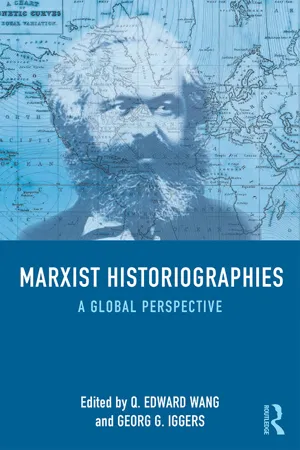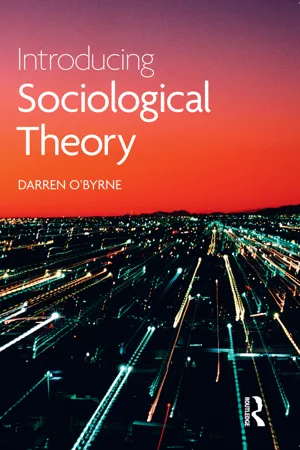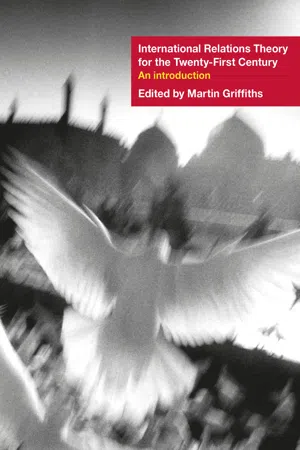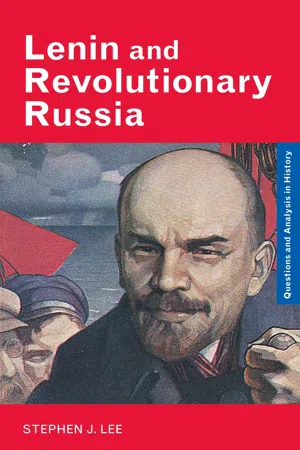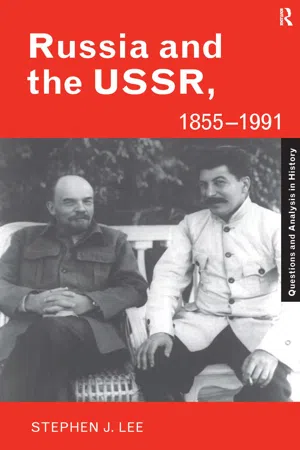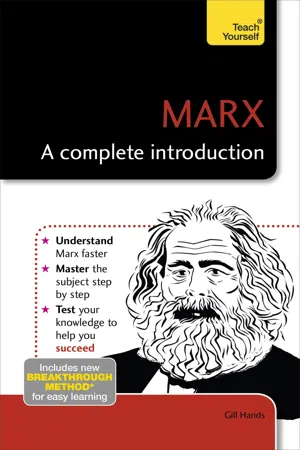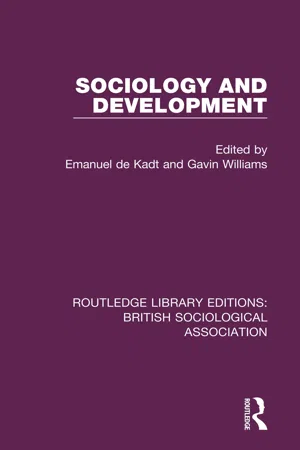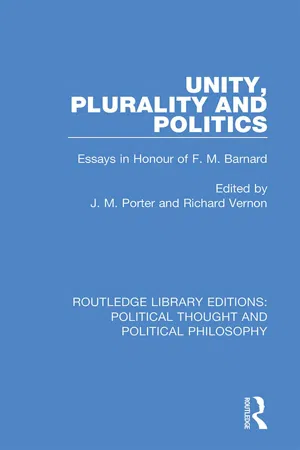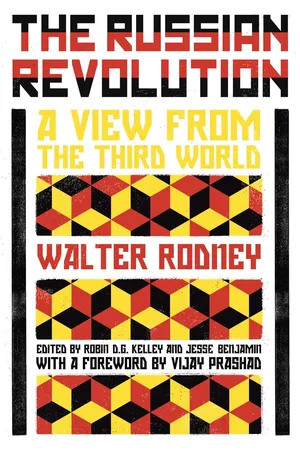History
Marxism in Russia
Marxism in Russia refers to the adoption and adaptation of Marxist ideology in Russia, particularly during the late 19th and early 20th centuries. It played a significant role in shaping the country's political and social landscape, ultimately leading to the Russian Revolution of 1917 and the establishment of the Soviet Union. Marxism in Russia influenced the development of socialist and communist movements worldwide.
Written by Perlego with AI-assistance
Related key terms
9 Key excerpts on "Marxism in Russia"
- eBook - ePub
Marxist Historiographies
A Global Perspective
- Q. Edward Wang, Georg G. Iggers, Q. Edward Wang, Georg G. Iggers(Authors)
- 2015(Publication Date)
- Routledge(Publisher)
Marxism and Marxist history
Passage contains an image
From the center to the margin
Mikhail KromThe fate of Marxism in contemporary Russian historiography1DOI: 10.4324/9781315686004-6Marxism is no longer popular with Russian historians: this news may seem a surprise to those who remember that just twenty-five years ago, in the Soviet Union, it was considered to be “the only true theory” that all the Soviet scholars, including historians, were expected to follow. To understand the reasons for this dramatic change it would be appropriate to have a quick look at the development of Soviet historiography during the last three decades that preceded the collapse of the USSR (1991).Soviet Marxism passed through several phases in its evolution. Before the late 1920s, it had coexisted in the humanities with non-Marxist views that had been labeled “bourgeois” but tolerated until a certain time. Around 1930, when Stalinism reached its climax, Marxism gained a monopoly on truth; all the other theories being ostracized. It was, however, a Pyrrhic victory: an “embrace” of the totalitarian regime produced a paralyzing effect on Marxist thought in the USSR. A short period of liberalization after Stalin’s death (1953) gave rise to expectations that official theory could be elaborated in a new and creative way but very soon, already by the early 1970s, these hopes had proved to be mere illusions.Working under very strong ideological pressure, Soviet historians took different attitudes toward the dominant doctrine. Some of them, such as Mikhail Pokrovskii (1868–1932) or, later in the postwar time, Boris Porshnev (1905–1972) really tried to contribute to a Marxist theory of history, the so-called “historical materialism.” Such theoreticians were but few. A more limited and pragmatic use of Marxism was far more widely spread: historians often used Marxist terminology and some quotations from Marx, Engels, and Lenin (before 1956, also from Stalin) to revise a specific field of research, to attack their opponents’ views, and to back up their own ones. In this way, for instance, Boris Grekov (1882–1953) used Marxist postulates to maintain that Kiev Rus’ was a feudal society, and not a slaveholding one, as some of his opponents asserted. Finally, there also existed a category of scholars who just paid lip-service to Marxism, inserting quotations from “classics of Marxism-Leninism” into prefaces and introductions to their highly empiricist or positivistic works.2 As Georg G. Iggers aptly remarks, these quotations were “often perfunctory and not central to research based on careful examination of the archival materials.”3 - eBook - ePub
- Darren O'Byrne(Author)
- 2013(Publication Date)
- Routledge(Publisher)
MarxismIn this chapter we will be:- introducing the key ideas that underpin the theoretical approach known as Marxism;
- identifying the significance of Karl Marx in the development of these ideas;
- contrasting different types of Marxist-influenced sociological theory which have emerged in the last hundred years or so;
- looking at Marx’s theory of historical change, called historical materialism, and considering some criticisms of this idea;
- looking at the suggestion that Marxism is a form of economic determinism, and how those sympathetic to it have sought to overcome this problem;
- discussing the core Marxist idea, that capitalist societies are defined by unequal class relations, and asking what these terms mean;
- considering some contemporary developments in Marxist theory in the light of more recent changes in society.
Marx and Marxism
Marxism is the broad sociological and political tradition named in honour of its ‘founder’, the nineteenth-century German theorist and activist, Karl Marx . If you are already reasonably familiar with sociology, you are probably already aware that Marxism has made a pretty significant contribution to the history of the discipline. If you are not, though, you may be associating it and its founder more with a certain kind of political theory, ‘communism’, which, for a large chunk of the twentieth century, was the way of life in what was then the Soviet Union and eastern Europe, and stood in stark contrast to the capitalism of the West. When I was throwing out some old notes from my sociology classes at school, I found it amusing that the first sentence on Marxism stated that ‘two thirds of the world is run under this system’. Looking back on it, I realised how unhelpful it must have been to have seen Marxism first and foremost in relation to a form of political organisation, which was duly demonised as the ‘enemy’ of the West during the Cold War – talk about prejudicing a choice on the merits of a Marxist theory! And that is the point – Marxism is a general theory of society, not a ‘system’ of state administration. Far better to start with an evaluation of Marxism as such a theory, which draws particular attention to what is wrong - eBook - ePub
International Relations Theory for the Twenty-First Century
An Introduction
- Martin Griffiths, Martin Griffiths(Authors)
- 2007(Publication Date)
- Routledge(Publisher)
4 Marxism Mark RupertIntroduction
Deeply enmeshed in intellectual and political projects spanning well over a century and much of the world, Marxism – the tradition of ‘practical-critical activity’ founded by Karl Marx – defies reduction to any simple doctrine or single political position. Its breadth and diversity is illustrated by the sheer mass of Leszek Kolakowski’s multivolume survey Main Currents of Marxism (2005), a schematic overview of historical and actually existing Marxisms. Nevertheless, it is possible to understand this constellation of intellectual and political positions as constituting variants of historical materialism (the core of the Marxist worldview) insofar as they are animated by a critique of capitalism, understood as a particular historical form of organization of human social life, rather than a natural or necessary expression of some innate and invariant human nature. Without pretending to speak for the whole of Marxism, this chapter will present a particular interpretation of historical materialism and its relevance for global politics.Contrary to simplistic caricatures which retain in some quarters a measure of academic currency, historical materialism has focused its attention upon capitalism as a material way of life, an ensemble of social relations which has never been coterminous with ‘the economy’ as we know it in the modern world, nor with the so-called ‘domestic’ sphere putatively contained within the boundaries of the sovereign state. Marxism has much to say about historically evolving structures and practices which have crossed national boundaries and linked the domestic and the international, the economic and the political – much to say, in short, about the social production of global politics. Historical materialism suggests that states and systems of interstate and transnational power relations are embedded in and (re-)produced through systems of relations that encompass (among other things) the social organization of production. The latter is itself structured according to relations of class (and, many contemporary Marxists acknowledge, by race and gender as well as other relations of domination), and is an object of contestation among social classes, state managers, and other historically situated political agents. Thus politics is not confined to the formally public sphere of the modern state, but permeates the economic sphere as well: just as the state and interstate politics can profoundly shape economic and social life, so the politics of the economy can have enormous implications – not generally recognized within the terms of liberal worldviews – for the historical form taken by particular states and world orders constructed among states. The point here, it must be emphasized, is not to reconstruct global politics on the basis of an economistic reductionism in which all causality is seen as emanating from an already constituted, foundational economic sphere (a sort of universal independent variable), but rather to argue something very nearly the opposite – that politics and political stru ggle are essential aspects of the processes by which all social structures are (re-)produced, and hence that the analytical separation of political from economic life – as well as domestic and international aspects of these – represents a false dichotomy which obscures much of potential political importance. - eBook - ePub
- Stephen J. Lee(Author)
- 2008(Publication Date)
- Routledge(Publisher)
THE ORIGINS AND GROWTH OF Marxism in Russia TO 1905BACKGROUND
Marxism made its appearance in Russia during the early 1880s, as an alternative revolutionary ideology to populism; unlike the latter, it was based mainly on the urban workers. In 1898 the various Marxist groups united to form the Russian Social Democratic Labour Party (RSPLD), under the leadership of Lenin, Martov and an ex-populist, Plekhanov. The RSDLP was committed to ending the Tsarist regime and to the eventual establishment of a workers’ state. In Marxist terms this would involve the end of capitalism and of the bourgeoisie and the introduction of the ‘dictatorship of the proletariat’ – which would lead eventually to the ‘classless society’. The Party developed a propaganda structure and the newspaper Iskra (The Spark ).Before long, however, the Russian Social Democrats began to follow the same course as their Marxist equivalent in Germany, the SPD. Differences emerged between Lenin and other leading Social Democrats, especially Martov, on questions of organisation and strategy.These surfaced at the second Congress of the RSDLP (1903), which started in Brussels and was then reconvened in London. From the bitter debates emerged two factions, soon to become par ties in their own right. The Bolsheviks supported Lenin’s strategy of a party organisation based on strict discipline, operated by professional revolutionaries and avoiding collaboration with other opponents of the Tsarist regime. The Mensheviks, by contrast, favoured the more democratic approach to membership advocated by Martov, along with a period of co-operation with liberals and other members of the bourgeoisie. The key question was which of the Bolsheviks and Mensheviks were to develop the more appropriate strategy. After all, Russia’s unique social and political conditions meant that Marx and Engels had never even considered it as a possibility for early revolution. - eBook - ePub
Russia and the USSR, 1855–1991
Autocracy and Dictatorship
- Stephen J. Lee(Author)
- 2020(Publication Date)
- Routledge(Publisher)
As both an ideology and an institution, autocracy died with the Revolution of March 1917. The Tsar was forced to abdicate and autocracy replaced by a brief experiment with liberal democracy and moderate socialism by the Provisional Government. These alternatives lasted only a few months until, in October 1917, they were replaced by the ideology of Marxism-Leninism, or Communism.BASE, SUPERSTRUCTURE, THE DIALECTIC AND CLASS CONFLICT Figure 1.Soviet Communism
Marxism entered Russia during the 1880s, promoted by revolutionaries seeking an alternative to the Russian-based Populist groups. It was officially represented by the Russian Social Democratic Labour Party (RSDLP) from 1898, although this divided into moderate and radical approaches – Menshevism and Bolshevism respectively. The latter, Marxism-Leninism or Communism, became the official ideology of Russia and the Soviet Union between 1918 and 1991. Communism has remained in Russia since the collapse of the Soviet state, but as one of a number of ideologies competing for power through a new multi-party process.Marxism in whatever form derives ultimately from the writings of Karl Marx and Friedrich Engels. Despite the quantity and complexity of their writings, it is possible to identify three main constituents in their thought.The first was a determinist conception of society and of the relationship between economic circumstances and political power. They maintained that the foundation, or base, of society was always the state of economic development reached by the ruling class. The superstructure consisted of the political, juridical and religious institutions by which the ruling class maintained its grip. Any meaningful change to these institutions could be achieved only by removing the economic base from which they sprang. This immediately invalidated the sort of piecemeal reform to the superstructure that was often proposed by regimes attempting to maintain their base intact.The second component of Marxist theory was value and profit. The proletariat, Marx and Engels believed, were created and used by the bourgeoisie as wage labourers but were always paid far less than the real value of what they produced. The balance of the value therefore constituted profit, which was used as capital to exploit more wage labour. The proletariat, as a result, became ‘concentrated in greater masses’ and would seek to overcome their ‘misery, oppression, slavery, degradation, exploitation’.5 - eBook - ePub
- Gill Hands(Author)
- 2015(Publication Date)
- Teach Yourself(Publisher)
8 Marxism after Marx – ideas that changed the worldIn this chapter you will learn:• about the spread of Marxist thought• how socialism developed away from communism• what led to revolution in Russia and China• about the Cold War• about the decline of communismMarxism is a term that can be used in a number of different ways. It is used to describe political systems where the ideas of Marx are allegedly put into practice. It is also used to describe social, philosophical and political theories based on the ideas of Marx. Marx died over a century ago and his ideas have been discussed and have evolved in many different forms since then. Many branches of Marxist thought have developed throughout the world and schools of Marxism have flourished in academic circles. In this chapter, I will be looking at the way that Marx’s ideas spread around the world and influenced political systems. The development of communism as a political system, beginning with the Russian Revolution of 1918, led to Marx’s ideas becoming a major driving force in the history of the twentieth century. They were also a major part of the early socialist movement, which developed out of the labour movement.In addition to his few books, Marx wrote numerous articles, pamphlets and speeches, many of which were not published until after his death. Because of the vast body of his work and its complexity, it is easy for people to interpret his ideas in their own way and claim that their interpretation is the ‘true’ meaning of Marxism. In some ways it is similar to interpretation of the Bible; there are many kinds of churches that call themselves Christian but they all have their own ways of worshipping God and many believe that their way is the ‘right’ way. Many different regimes call themselves Marxist or communist, but they do not necessarily have similar ideologies or political systems. In fact, they may well have very little in common with the original ideas of Marx, except for the use of his name. In a letter to Eduard Bernstein in 1882 Engels claimed that Marx was puzzled by the misinterpretations of ideas, and had once said, ‘If anything is certain I am not a Marxist.’ - eBook - ePub
- Emanuel de Kadt, Gavin Williams(Authors)
- 2018(Publication Date)
- Routledge(Publisher)
PART ONE Marxism and Development DAVID LANE Leninism as an Ideology of Soviet Development Most analysis of Soviet society concentrates on its peculiar political features, either its totalitarian or its socialist character, and surprisingly few writers have tried to interpret the USSR as a developing society. 1 One exception is Marcuse’s classic study Soviet Marxism which in many places recognizes that the Soviet regime ensures ‘total mobilization of the individuals for the requirements of competitive total industrialization’ (1958: 259). This relative lack of emphasis in the west in considering the Soviet Union as a model of development stems from two sources. First there is the west European Marxist tradition of regarding ‘socialism’ as a qualitatively superior social and moral system to capitalism, and this is also the primary concern of Marcuse. But Marxism as interpreted by Lenin, and particularly by his followers in the USSR who have articulated the ideology of Leninism, is very much concerned with the role of development in societies that are economically at the pre-capitalist stage. Second, and perhaps more important, is the view that Russia in 1917 was far ahead of societies that are now regarded as underdeveloped or undeveloped. As Rostow (1960: 95) has put it, ‘the Russian take-off was under way by the 1890s. . .’. Also, Russia has a long and deep European tradition, which distinguishes it from many other countries of the Third World. While these objections must be given a prominent place when evaluating Soviet experience they do not detract from the fact that Russia in 1917 was one of the most backward countries in Europe, having a predominantly rural, agricultural, and illiterate peasant population - eBook - ePub
Unity, Plurality and Politics
Essays in Honour of F. M. Barnard
- J. M. Porter, Richard Vernon(Authors)
- 2019(Publication Date)
- Routledge(Publisher)
9 ; it becomes (as it became in Germany) the inspirer and educator of the worker in his transition to a fully industrial life. But when the industrial society and the industrial ethos have become firmly established (as they did in Germany’ around 1900, and in England earlier), Marxism loses its relevance. The workers turn to labourism and the demand for better housing and higher wages; the middle classes look for status and security. The disintegration of Marxism referred to by Dr. Meyer sets in apace precisely because the proletariat ceases to perform the function vital for Marxist hopes. Thus, in Germany, from 1900 or so onward, the ‘Marxism’ of the German Social-Democratic Party served only to frighten the middle classes; it had less significant effect on social policies or even on the practical demands of the working-class and of the SPD itself. In Russia toward the end of the nineteenth century, on the other hand, Marxism was relevant as it is relevant in agrarian societies turning toward industrialisation to-day. Russia was being rapidly precipitated into the industrial age, while its society was of the type to maximise anarchist reactions. It was on a wave of anarchist reaction that the Bolsheviks came to power in 1917, when Lenin deliberately deepened the anarchist content of Marxism to make a direct appeal to the peasant with his slogan of ‘Land, Peace and Bread’; once in power, he used Marxism to intensify the cult of technology, to make socialism depend upon electrification. Just as Marxism could make bearable for the worker the smoke and misery of the growing industrial settlements of the west, so it could palliate for the Russian the ‘crash programmes’ of the Stalinist dictatorship, just as it palliated the crash programmes of the Chinese dictatorship in the period now called ‘the rule of the Gang of Four’. (The revival of Marxism in western European societies in recent years is not based on the industrial worker, but on a new crisis of industrial society and of the cult of technology in general; it is based on the Marxism of 1844–48 rather than the Marxism of the 1870s.)It is a matter of dispute, and it will no doubt remain a matter of dispute, to what extent the Bolshevik and Communist Chinese rise to secure power can be ascribed to the appeal and legitimating function of their ideology and to what extent it was a result of cynical opportunism and single-minded use of terror even in those few communist societies where communism was not imposed by the force of foreign arms. There is no dispute among serious students of communist societies that Marxism as a legitimating ideology disintegrates as those societies pass beyond the mobilisational stages of rapid revolutionary change and forced industrialisation into a modern industrial and post-industrial ethos. Complexity, the need for state and legal organisation, the emergence of classes, strata and interest groups become all too evident. Marxism begins to be judged by its present achievements and not its future claims and is found wanting – implicitly by the leadership, explicitly by the population. - eBook - ePub
The Russian Revolution
A View from the Third World
- Walter Rodney(Author)
- 2018(Publication Date)
- Verso(Publisher)
With capitalist development, the commune was breaking up, the bourgeoisie were growing stronger and more numerous, and above all a very disciplined and self-conscious proletariat was arising. New theories could therefore be put forward. Russian Marxism was only called forth at a particular phase of its historical development, although Marxism was abroad in Europe for forty years. I want to recall something Engels said when reviewing Marx’s Critique of Political Economy: “Political Economy is the theoretical analysis of modern bourgeois society and therefore pre-supposed developed bourgeois conditions.” 39 Marxism, in other words, does not have any special claim for itself; as a set of ideas, it is part of the superstructure and should be historically explained as a consequence of certain socioeconomic changes. Naturally, the rise of the new mode of thought is not sudden, nor is it unrelated to the prevailing modes, especially given the fact that the prevailing modes were themselves changing and being modified. This is another complication, but it has to be introduced to avoid the impression that things were static, which they very seldom are. Under the impact of changes in the modes of production (that is, the rise of capitalist relations and decline of feudal relations like serfdom), the Narodniks and the terrorists were themselves moving to a more progressive position. They had to consider the reality of capitalism as Chernyshevsky did; they had to start thinking of working men and reading and translating Marx, as Lenin’s brother did; and some of them were rethinking their position on terrorism
Index pages curate the most relevant extracts from our library of academic textbooks. They’ve been created using an in-house natural language model (NLM), each adding context and meaning to key research topics.
